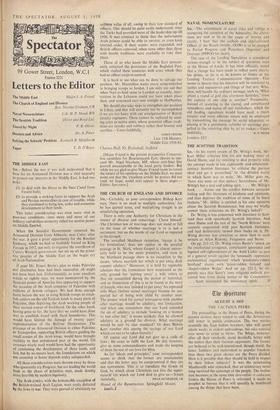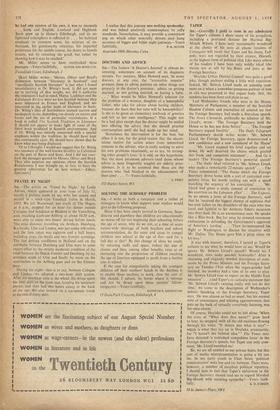THE SCOTTISH TRADITION
SIR,—In his recent review of Dr. Wittig's hook. Mr. Karl Miller criticises him for not making more of David Hume, and for omitting to deal properly with the attempt made in late eighteenth- and nineteenth- century Scottish literature 'to criticise the puritan ideal and get it proscribed.' • In 'the divided world in which Scott was to write,' Mr. Miller goes on, 'there was none of that unitary Scottishness of Mr. Wittig's but a real and aching split. . . Mr. Wittig's book . . leaves out the conflict between sectarian feeling and this literature of kindness and optimism, and thus deprives the tradition of some of its finest features.' Mr. Miller is entitled to his own opinions about the Scottish Renaissance, but may we briefly answer these criticisms on Dr. Wittig's behalf?
Dr. Wittig is less concerned with literature in Scot- land than with specifically Scottish literature. And since Hume and the rest of the 'North Britons' were scarcely acquainted with past Scottish literature, and had deliberately turned their backs on it, Dr. Wittig devotes less attention to them than to such writers as Allan Ramsay, Fergusson and Burns.
On pp. 211-12, Dr. Wittig treats Burns's 'attack on the intellectual arrogance, complacent ignorance and bigoted self-righteousness of the Auld Lichts' as part of a general revolt against the 'unusually oppressive ecclesiastical organisation' which 'presbytery-ridden Scotland' shares with 'priest-ridden Ireland' and 'chapel-ridden Wales.' And on pp. 221-2, he ex- pressly says that Scott's 'own religious outlook pre- vented him from doing justice to the Covenanters.
. . Scott mistrusted the missionary spirit. . . . If
be had any mission of his own, it was to reconcile
. . Scots and English, Lowland and Highland. Scott grew up in Hume's Edinburgh, and its en- lightened atmosphere is reflected in . . . his habitual emphasis on common sense, his mistrust of en- thusiasm, his gentlemanly reticence, his impartial preference for the middle course, his desire to benefit society, not by revealing the good, but rather by showing how it may be reached.'
Mr. Miller •seems to have overlooked these passages.—YOurs faithfully, OLIVER AND BOYD LTD.
Tweeddale Court, Edinburgh, 1
'Marl Miller writes: 'Messrs. Oliver and Boyd's distinction between "literature in Scotland" and "specifically Scottish literature" is just what I found unsatisfactory in Dr. Wittig's book. It did not seem up to carrying all that weight, nor did it authorise the omissions I had in mind. Hume, Lockhart and the Edinburgh Review were no less Scottish because they were interested in France and England, and un- interested in the earlier body of literature in Scots. Dr. Wittig's idea of Scottishness seemed narrow and inadequate to me, depending too closely on metres and forms and the use of particular vocabularies. If a book is called The Scottish Tradition in Literature it should not appear to make light of some of the finest work produced in Scottish environments. And if Dr. Wittig was entirely concerned with a special emphasis within the tradition, he should have kept this consistently clear. He should have shown that he knew what was being displaced.
'Or so I thought. I would not suggest that Dr. Wittig was unaware of the well-known hostility to Calvinism on the part of Burns and Scott. And I did not over- look the Passagei quoted by Messrs. Oliver and Boyd. They also mention my opinions about the Scottish Renaissance. I was brought up, in fact, to have the greatest admiration for its best writers.'—Editor, Spectator.]































 Previous page
Previous page